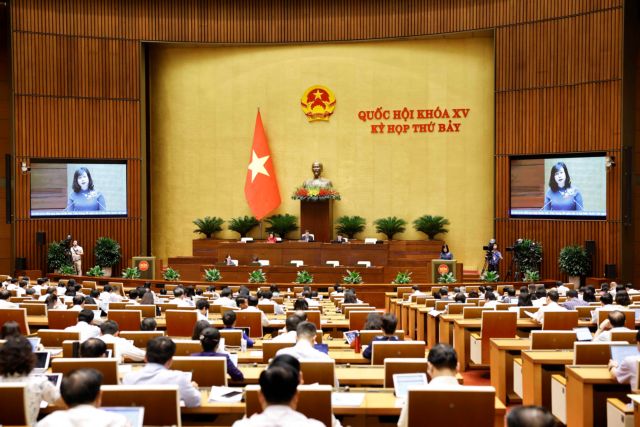 |
| Minister of Health Đào Hồng Lan presents the summary of the draft revisions to the pharmaceutical law on Tuesday. — VNA/VNS Photo |
HÀ NỘI — Minister of Health Đào Hồng Lan, on behalf of the Government, presented to the National Assembly the draft revisions to the pharmaceutical law, which contained many significant changes.
On Tuesday Lan noted that the 2016 Pharmaceutical Law, which replaced the 2005 law, while creating legal foundation for the industry to develop in a transparent manner and reflecting regional and global standards in defining good practices, proved outdated in some areas.
After seven years, she said there were a number of cumbersome regulations related to registration of pharmaceutical circulation and raw materials, quality management of medicines and drug price mechanisms, not in line with new administrative reforms.
Some policies on pharmaceutical industry development had not created significant breakthroughs for the Vietnamese pharmaceutical industry, she also noted.
The draft revisions seek to ensure timely access to quality and reasonably priced medicines for the public, timely resolve institutional and legal difficulties in pharmaceutical management activities, ensure the availability of medicines for disease prevention and control and for an urgent situations, according to the minister.
The new bill will also continue streamlining various procedures in pharmaceutical activities, ensuring increased access to medicines for the public and creating favourable conditions for citizens and businesses.
For example, pharmaceutical producers can be exempted from submitting clinical dossiers in the application for the authorisation of new drugs (except vaccines) that are produced domestically and indicated for the prevention or treatment of Group A diseases, that have been declared as epidemics, according to the regulations on the prevention and control of infectious diseases.
It should take no more than nine months from the receipt of complete dossiers for new drugs, reference biological products, similar biological products and vaccines with evaluation reports from a stringent regulatory authority (SRA).
With the rise of e-commerce, especially in the wake of COVID-19 pandemic, the new bill adds regulations on medicines and materials sold on these platforms and seeks to ban the sales of pharmaceutical products on social media.
The National Assembly's Social Affairs Committee, in assessing the bill, said there should be more in-detail regulations on what kind of medicines can be sold online and who is allowed to buy or sell them.
Most of the committee's members are in favour of only allowing retail trading of non-prescription medicines, medicines that are not restricted or ones that do not require the supervision of a physician.
But some agree with the Government's view which is not to specify the types of medicines but to assign the Minister of Health to regulate them, ensuring flexibility to meet the demands of scientific and technical advancements. — VNS